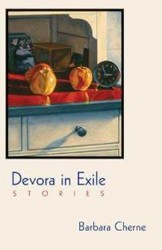By
– December 14, 2011
Something about the characters in Jacob Lampart’s stories makes me worry if they will be all right in the end. This concern comes about because Lampart often begins with a character who is in the midst of a heartbreaking event. In the story “Joanna Loves Jesus,” for example, a rabbi visits his daughter, who has been in a horrific car accident, but he is more distraught about her attraction to the Catholic religion than he is about her physical well-being. Because he feels guilty about her rebellion against everything he has taught her, he studies whatever he can about Catholicism, and even watches gospel TV shows. What finally happens is hugely ironic and totally unpredictable.
Lampart’s characters often surprise us. We think we know them from the way they talk or think and then they behave in unexpected ways. Their conversations are frequently soul-baring — very little small talk for these people. In “Miss Finkelstein,” the narrator, who disparages his neighbors, visits the title character and finds himself starting to make love to her. She tells him, “I’ve been next door for years. You didn’t see me. You didn’t talk to me. You never looked at me the way you’re looking at me now.” Although she wants him to make love to her, she has to get the truth out first.
A wry sense of humor underlies many of the stories, as in “Dear Mr. G,” which is composed of letters from a down-and-out Holocaust survivor named M. Znessener to a famous actor turned director. He would like to be an advisor and subject on a new film dealing with the cruelties inflicted on concentration camp inmates during World War II. He feels that this Mr. G, who has made a movie about the torture of Jesus Christ, would be astonished at what tortures Znessener knows about from experience. We gradually realize that he is writing to Mel Gibson.
Most of Lampart’s stories include aspects of the rituals and laws of Orthodox Jews. In “New Stoned City,” a thirty-year-old drug addict returns to New York for Passover with his mother. Lampart contrasts his physical being, “eyes red from a long sleepless night, skin crawling with imaginary bugs, his tongue a slab of raw liver” with his seventy-two-year-old mother who is “in the bloom of health…When she walks, she and her body are on excellent terms.” She is concerned with getting her house kosher enough for Pesach while her son is only concerned with how soon the Seder can be done with so he can get his next hit. The ending delivers a kind of accidental justice to both of them.
Lampart’s characters intrigue me at the beginning of each and every story; I only wish most of them didn’t dismay and disappoint me at the end.
Lampart’s characters often surprise us. We think we know them from the way they talk or think and then they behave in unexpected ways. Their conversations are frequently soul-baring — very little small talk for these people. In “Miss Finkelstein,” the narrator, who disparages his neighbors, visits the title character and finds himself starting to make love to her. She tells him, “I’ve been next door for years. You didn’t see me. You didn’t talk to me. You never looked at me the way you’re looking at me now.” Although she wants him to make love to her, she has to get the truth out first.
A wry sense of humor underlies many of the stories, as in “Dear Mr. G,” which is composed of letters from a down-and-out Holocaust survivor named M. Znessener to a famous actor turned director. He would like to be an advisor and subject on a new film dealing with the cruelties inflicted on concentration camp inmates during World War II. He feels that this Mr. G, who has made a movie about the torture of Jesus Christ, would be astonished at what tortures Znessener knows about from experience. We gradually realize that he is writing to Mel Gibson.
Most of Lampart’s stories include aspects of the rituals and laws of Orthodox Jews. In “New Stoned City,” a thirty-year-old drug addict returns to New York for Passover with his mother. Lampart contrasts his physical being, “eyes red from a long sleepless night, skin crawling with imaginary bugs, his tongue a slab of raw liver” with his seventy-two-year-old mother who is “in the bloom of health…When she walks, she and her body are on excellent terms.” She is concerned with getting her house kosher enough for Pesach while her son is only concerned with how soon the Seder can be done with so he can get his next hit. The ending delivers a kind of accidental justice to both of them.
Lampart’s characters intrigue me at the beginning of each and every story; I only wish most of them didn’t dismay and disappoint me at the end.
Eleanor Ehrenkranz received her Ph.D. from NYU and has taught at Stern College, NYU, Mercy College, and at Pace University. She has lectured widely on Jewish literature and recently published anthology of Jewish poetry, Explaining Life: The Wisdom of Modern Jewish Poetry, 1960 – 2010.





